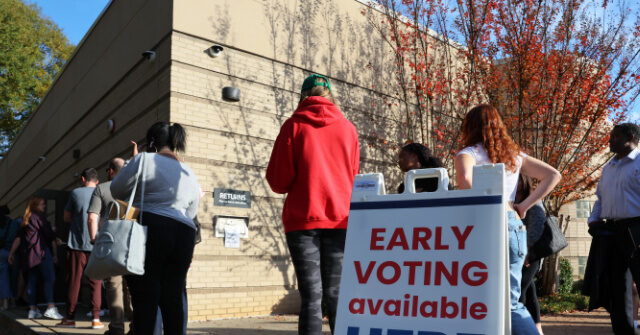In Georgia, the early voting period for the 2024 presidential election has begun with a remarkable turnout, as over one million voters had already cast their ballots within just four days of voting, according to Gabriel Sterling, the chief deputy to Secretary of State Brad Raffensperger. Sterling celebrated the achievement, emphasizing enthusiasm among voters and urging continued participation in the electoral process. This milestone reflects the heightened interest and engagement among Georgia residents in the upcoming election, showcasing the state’s increasingly pivotal role in shaping national politics.
The enthusiasm for early voting has set new records, particularly noted on the first day when around 300,000 people participated compared to the previous record of 136,000, as highlighted by former Senator Kelly Loeffler. On the second day, approximately 550,000 voters had cast their ballots, indicating that about ten percent of Georgia’s electorate had already participated within the initial days of early voting. Loeffler underscored that the last day of early voting often sees the highest turnout, suggesting that the total participation could exceed expectations and reflect unprecedented voter engagement for this upcoming election cycle.
Contributing to the buzz surrounding early voting is a recent poll from ECU that indicates former President Donald Trump leading Vice President Kamala Harris by three percentage points in Georgia, garnering 49 percent support compared to Harris’s 46 percent. Additionally, a majority of likely voters in the state have favorable opinions of Trump and his running mate, J.D. Vance, while Harris and her vice-presidential counterpart, Tim Walz, also maintain considerable support. The division of voter preferences suggests a nuanced landscape where demographic factors heavily influence voting patterns and political affiliations within Georgia.
The survey revealed interesting demographic trends, notably Trump’s significant lead among male voters—18 percentage points over Harris—while the Vice President leads among women by eight points. Among senior voters aged 65 and older, Trump maintains a ten-point advantage, signifying his appeal in this older demographic, whereas younger voters (ages 18 to 29) favor Harris. Additionally, educational attainment plays a crucial role in voter preferences, with Harris leading among those with a four-year college degree or higher, while Trump holds a strong lead among those without such qualifications. These findings illustrate the complexities of Georgia’s electorate and how various factors contribute to voter preferences.
Michael Whatley, chair of the Republican National Committee, expressed satisfaction with early voting trends in Georgia and other states like North Carolina, the latter experiencing a record turnout among Republican supporters. Whatley’s comments suggest that Republicans are optimistic about their prospects as they witness robust early engagement from their base in these critical battleground states. The early voting metrics could serve as optimistic indicators of party strength and voter mobilization efforts as the election approaches.
The early voter engagement and shifting opinion polls signal a vibrant and competitive electoral landscape in Georgia, highlighting the importance of this state in the national political scene. With record-breaking turnout and a closely contested race taking shape, the upcoming presidential election will likely hinge on continued voter engagement and mobilization from both parties. Each participant in the electoral process, whether through early voting or on Election Day, will play a crucial role in determining the outcome of what is poised to be a highly consequential election in November 2024.

